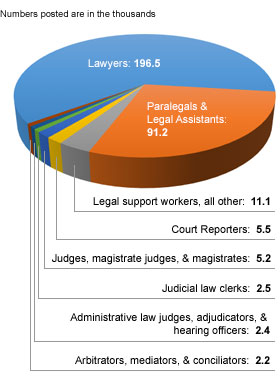When a lawyer represents a client in a court of law, the judge oversees and applies the legal process. Many judges start out as lawyers and the educational routes are typically parallel, as well. Almost all judges are employed by local, state and federal governments, which means there are judges at every level of the court system.
How to Become a Judge
Most local, state and federal jobs as a judge require a law degree. Please look here (or link to our site’s page where the Lawyer profile will be housed) for information on how to earn a law degree. Federal Administrative law judges must also pass a competitive exam administered by the U.S Office of Personnel Management.
Even with the proper academic credentials, most judges must still be elected into judge positions. This often requires political backing, which involves factors such as reputation and prior legal experience. Many local and state judges are appointed to serve fixed renewable terms, ranging from 4 to 14 years. However, a few judges, such as appellate court judges, are appointed for life.
Salary
Although the annual salary of a judge will vary with experience and other factors, The Bureau of Labor Statistics reports that the median annual wage for judges was $115,760 in May 2012. Administrative law judges was $87,240.
Work Life
The work lives of judges are generally demanding. Given the amount of preparation needed to oversee case hearings, most judges work full-time and long hours. However, some judges work part-time, splitting their hours between their judicial responsibilities and other careers. Other judges even travel to different countries or parts of a state in order to oversee judicial hearings.
Given that emergency orders could be requested at any time, judges should also expect to be on-call during nights and weekends. In terms of work environment, judges operate mostly in offices and courtrooms. Hearings are often long processes, which means judges should be prepared to spend long hours in their offices and court rooms. Throughout their careers, judges may be required to do the following in their work life:
- Research legal issues
- Read and evaluate information from documents, such as motions, claim applications, and records
- Preside over hearings and listen to and read arguments by opposing parties
- Determine if the information presented supports the charge, claim, or dispute
- Apply laws or precedents to reach judgments and to resolve disputes between parties
- Write opinions, decisions, and instructions regarding cases, claims, and disputes
For more information about judges and the court system, please visit here.
Citation
Bureau of Labor Statistics, U.S. Department of Labor, Occupational Outlook Handbook, 2014-15 Edition, Judges and Hearing Officers,
on the Internet at http://www.bls.gov/ooh/legal/judges-and-hearing-officers.htm (visited October 10, 2014).
